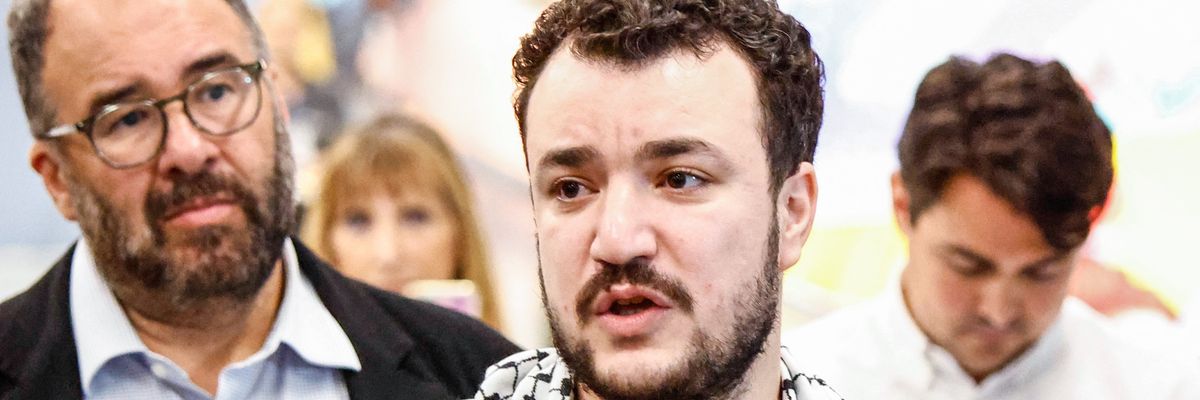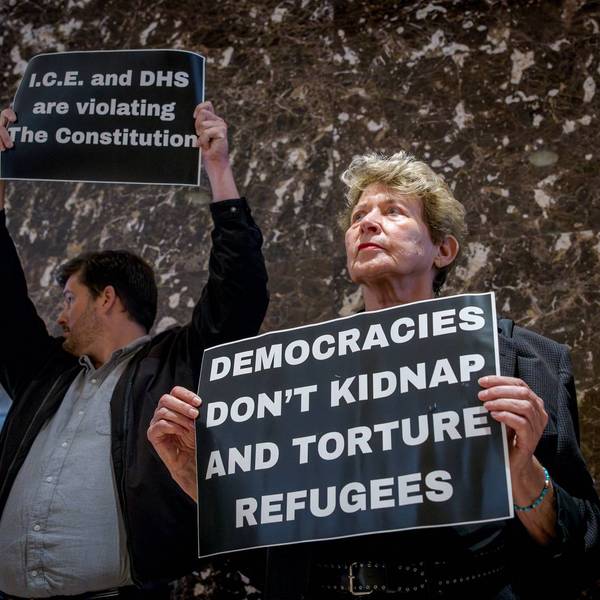
Former Columbia University student Mahmoud Khalil speaks to the press as he arrives in Newark, New Jersey, on June 21, 2025.
DHS Official Admits Agency Used Secretive Pro-Israel Group's Blacklist to Target Foreign Students
"The U.S. government is laundering repression through a private blacklist," said one pro-Palestinian news outlet.
Confirming what students detained by the Trump administration have suspected for months, a senior homeland security official on Wednesday admitted for the first time that his agency had used a website run by a secretive pro-Israel group that compiles "blacklists" of pro-Palestinian students as it worked to carry out President Donald Trump's policy of arresting international students for their protest activities earlier this year.
In a courtroom in Massachusetts during a hearing on a Harvard University faculty group's lawsuit over Trump's attempts to deport pro-Palestinian students, Immigration and Customs Enforcement (ICE) official Peter Hatch testified under oath that a task force he formed in March scoured a list compiled by Canary Mission, an operation linked to Israel's intelligence agencies, to compile reports on the students on the list.
Hatch, the assistant director of ICE's homeland security investigations department, said the team was ordered to rush an analysis of roughly 5,000 students listed on Canary Mission's website, which includes photos and names of students who have taken part in "anti-Israel events." One student listed participated in a student walkout at Harvard University in support of boycotting Israel, and another attended a rally organized by Jews for Cease-fire.
Such allegations were evidently enough to warrant Hatch's team compiling reports on 100-200 of the non-citizen students listed on Canary Mission's website. Hatch said the team relied on Canary Mission's list as well as a list compiled by another pro-Israel group, Betar Worldwide.
Hatch told lawyers for the plaintiffs in the American Association of University Professors' (AAUP) lawsuit and Judge William G. Young of the Federal District Court in Massachusetts that his team's reports detailed the students' employment and travel history, criminal activity, and alleged support for terrorist groups such as Hamas. He said the students' use of phrases including "Free Palestine" were included in the reports as well.
The Trump administration has claimed students have shown "support for terrorist groups" simply by participating in protests against Israel's U.S.-backed assault on Gaza, where at least 57,762 Palestinians have been killed by Israeli forces since October 2023. Nearly 70% of those killed in Gaza were verified by the United Nations to be women and children as of November 2024, even as both Democratic and Republican U.S. lawmakers have claimed Israel is targeting Hamas.
Hatch's team sent the reports on students to the U.S. State Department, where Secretary of State Marco Rubio later said Columbia University student organizer Mahmoud Khalil's participation in protests was detrimental to U.S. foreign policy interests, after Khalil was arrested by ICE. Khalil was ultimately detained in Louisiana for three months.
Hatch testified that the ICE office used the lists compiled by Canary Mission and Betar "without a firm understanding of the methodology through which individuals came to be included on either record," according to The New York Times.
Five of the students included in the reports sent to the State Department have been named in the AAUP's lawsuit as non-citizen students who were targeted by ICE for their pro-Palestinian speech.
The AAUP and other plaintiffs in the case argue the Trump administration has imposed an "ideological deportation policy" by detaining and trying to remove Khalil, Tufts University student Rümeysa Öztürk, Columbia University student Mohsen Mahdawi, and others.
Students have posited for months that Canary Mission's blacklists were likely involved in the administration's rounding up of pro-Palestinian organizers, with Sophie Hurwitz reporting at Mother Jones this week that Öztürk was detained only "after being smeared on Canary Mission's website, being falsely labeled as being antisemitic."
A judge who ordered the release of another student activist, Efe Ercelik of the University of Massachusetts, Amherst, said Ercelik had been jailed "almost exclusively" because he was included in blacklists compiled by Canary Mission and Betar.
Khalil's lawyers filed a Freedom of Information Act request after his arrest, seeking information about Canary Mission's role in his targeting by ICE. The group's anonymously run website includes an extensive report on Khalil's expressions of support for Palestinians and his protest activities.
But Hatch's testimony marks the first time Canary Mission's involvement in the targeting of students has been acknowledged by the administration.
Young ordered the Trump administration to provide partially redacted reports that Hatch's team compiled on students to the plaintiffs' lawyers on Wednesday evening.
As James Bamford wrote at The Nation in December 2023, Canary Mission is "a key intelligence asset for the Ministry of Strategic Affairs, a highly secretive intelligence organization that is largely focused on the United States." A profile of Palestinian American student Lara Alqasem was compiled by Canary Mission and used to prevent her from entering Israel in 2018; Alqasem was planning to study at the Hebrew University of Jerusalem, but Israel attempted to bar her from doing so because she was the chapter president of Students for Justice in Palestine at the University of Florida.
The pro-Palestinian news outlet Mondoweiss said the information disclosed by Hatch on Wednesday "is bigger than one trial."
"The U.S. government is laundering repression through a private blacklist," said Mondoweiss. "It's criminalizing dissent, undermining free speech, and exporting Israel's surveillance playbook into U.S. policy."
An Urgent Message From Our Co-Founder
Dear Common Dreams reader, The U.S. is on a fast track to authoritarianism like nothing I've ever seen. Meanwhile, corporate news outlets are utterly capitulating to Trump, twisting their coverage to avoid drawing his ire while lining up to stuff cash in his pockets. That's why I believe that Common Dreams is doing the best and most consequential reporting that we've ever done. Our small but mighty team is a progressive reporting powerhouse, covering the news every day that the corporate media never will. Our mission has always been simple: To inform. To inspire. And to ignite change for the common good. Now here's the key piece that I want all our readers to understand: None of this would be possible without your financial support. That's not just some fundraising cliche. It's the absolute and literal truth. We don't accept corporate advertising and never will. We don't have a paywall because we don't think people should be blocked from critical news based on their ability to pay. Everything we do is funded by the donations of readers like you. Will you donate now to help power the nonprofit, independent reporting of Common Dreams? Thank you for being a vital member of our community. Together, we can keep independent journalism alive when it’s needed most. - Craig Brown, Co-founder |
Confirming what students detained by the Trump administration have suspected for months, a senior homeland security official on Wednesday admitted for the first time that his agency had used a website run by a secretive pro-Israel group that compiles "blacklists" of pro-Palestinian students as it worked to carry out President Donald Trump's policy of arresting international students for their protest activities earlier this year.
In a courtroom in Massachusetts during a hearing on a Harvard University faculty group's lawsuit over Trump's attempts to deport pro-Palestinian students, Immigration and Customs Enforcement (ICE) official Peter Hatch testified under oath that a task force he formed in March scoured a list compiled by Canary Mission, an operation linked to Israel's intelligence agencies, to compile reports on the students on the list.
Hatch, the assistant director of ICE's homeland security investigations department, said the team was ordered to rush an analysis of roughly 5,000 students listed on Canary Mission's website, which includes photos and names of students who have taken part in "anti-Israel events." One student listed participated in a student walkout at Harvard University in support of boycotting Israel, and another attended a rally organized by Jews for Cease-fire.
Such allegations were evidently enough to warrant Hatch's team compiling reports on 100-200 of the non-citizen students listed on Canary Mission's website. Hatch said the team relied on Canary Mission's list as well as a list compiled by another pro-Israel group, Betar Worldwide.
Hatch told lawyers for the plaintiffs in the American Association of University Professors' (AAUP) lawsuit and Judge William G. Young of the Federal District Court in Massachusetts that his team's reports detailed the students' employment and travel history, criminal activity, and alleged support for terrorist groups such as Hamas. He said the students' use of phrases including "Free Palestine" were included in the reports as well.
The Trump administration has claimed students have shown "support for terrorist groups" simply by participating in protests against Israel's U.S.-backed assault on Gaza, where at least 57,762 Palestinians have been killed by Israeli forces since October 2023. Nearly 70% of those killed in Gaza were verified by the United Nations to be women and children as of November 2024, even as both Democratic and Republican U.S. lawmakers have claimed Israel is targeting Hamas.
Hatch's team sent the reports on students to the U.S. State Department, where Secretary of State Marco Rubio later said Columbia University student organizer Mahmoud Khalil's participation in protests was detrimental to U.S. foreign policy interests, after Khalil was arrested by ICE. Khalil was ultimately detained in Louisiana for three months.
Hatch testified that the ICE office used the lists compiled by Canary Mission and Betar "without a firm understanding of the methodology through which individuals came to be included on either record," according to The New York Times.
Five of the students included in the reports sent to the State Department have been named in the AAUP's lawsuit as non-citizen students who were targeted by ICE for their pro-Palestinian speech.
The AAUP and other plaintiffs in the case argue the Trump administration has imposed an "ideological deportation policy" by detaining and trying to remove Khalil, Tufts University student Rümeysa Öztürk, Columbia University student Mohsen Mahdawi, and others.
Students have posited for months that Canary Mission's blacklists were likely involved in the administration's rounding up of pro-Palestinian organizers, with Sophie Hurwitz reporting at Mother Jones this week that Öztürk was detained only "after being smeared on Canary Mission's website, being falsely labeled as being antisemitic."
A judge who ordered the release of another student activist, Efe Ercelik of the University of Massachusetts, Amherst, said Ercelik had been jailed "almost exclusively" because he was included in blacklists compiled by Canary Mission and Betar.
Khalil's lawyers filed a Freedom of Information Act request after his arrest, seeking information about Canary Mission's role in his targeting by ICE. The group's anonymously run website includes an extensive report on Khalil's expressions of support for Palestinians and his protest activities.
But Hatch's testimony marks the first time Canary Mission's involvement in the targeting of students has been acknowledged by the administration.
Young ordered the Trump administration to provide partially redacted reports that Hatch's team compiled on students to the plaintiffs' lawyers on Wednesday evening.
As James Bamford wrote at The Nation in December 2023, Canary Mission is "a key intelligence asset for the Ministry of Strategic Affairs, a highly secretive intelligence organization that is largely focused on the United States." A profile of Palestinian American student Lara Alqasem was compiled by Canary Mission and used to prevent her from entering Israel in 2018; Alqasem was planning to study at the Hebrew University of Jerusalem, but Israel attempted to bar her from doing so because she was the chapter president of Students for Justice in Palestine at the University of Florida.
The pro-Palestinian news outlet Mondoweiss said the information disclosed by Hatch on Wednesday "is bigger than one trial."
"The U.S. government is laundering repression through a private blacklist," said Mondoweiss. "It's criminalizing dissent, undermining free speech, and exporting Israel's surveillance playbook into U.S. policy."
- Warning of Grave Threat to Free Speech, Judge Frees Rümeysa Öztürk ›
- ICE Arrests Palestinian Green Card Holder Who Helped Lead Columbia's Gaza Solidarity Camp ›
- Tufts PhD Student and Farmworker Organizer Latest Targets as ICE Agents Operate 'Like Kidnappers' ›
Confirming what students detained by the Trump administration have suspected for months, a senior homeland security official on Wednesday admitted for the first time that his agency had used a website run by a secretive pro-Israel group that compiles "blacklists" of pro-Palestinian students as it worked to carry out President Donald Trump's policy of arresting international students for their protest activities earlier this year.
In a courtroom in Massachusetts during a hearing on a Harvard University faculty group's lawsuit over Trump's attempts to deport pro-Palestinian students, Immigration and Customs Enforcement (ICE) official Peter Hatch testified under oath that a task force he formed in March scoured a list compiled by Canary Mission, an operation linked to Israel's intelligence agencies, to compile reports on the students on the list.
Hatch, the assistant director of ICE's homeland security investigations department, said the team was ordered to rush an analysis of roughly 5,000 students listed on Canary Mission's website, which includes photos and names of students who have taken part in "anti-Israel events." One student listed participated in a student walkout at Harvard University in support of boycotting Israel, and another attended a rally organized by Jews for Cease-fire.
Such allegations were evidently enough to warrant Hatch's team compiling reports on 100-200 of the non-citizen students listed on Canary Mission's website. Hatch said the team relied on Canary Mission's list as well as a list compiled by another pro-Israel group, Betar Worldwide.
Hatch told lawyers for the plaintiffs in the American Association of University Professors' (AAUP) lawsuit and Judge William G. Young of the Federal District Court in Massachusetts that his team's reports detailed the students' employment and travel history, criminal activity, and alleged support for terrorist groups such as Hamas. He said the students' use of phrases including "Free Palestine" were included in the reports as well.
The Trump administration has claimed students have shown "support for terrorist groups" simply by participating in protests against Israel's U.S.-backed assault on Gaza, where at least 57,762 Palestinians have been killed by Israeli forces since October 2023. Nearly 70% of those killed in Gaza were verified by the United Nations to be women and children as of November 2024, even as both Democratic and Republican U.S. lawmakers have claimed Israel is targeting Hamas.
Hatch's team sent the reports on students to the U.S. State Department, where Secretary of State Marco Rubio later said Columbia University student organizer Mahmoud Khalil's participation in protests was detrimental to U.S. foreign policy interests, after Khalil was arrested by ICE. Khalil was ultimately detained in Louisiana for three months.
Hatch testified that the ICE office used the lists compiled by Canary Mission and Betar "without a firm understanding of the methodology through which individuals came to be included on either record," according to The New York Times.
Five of the students included in the reports sent to the State Department have been named in the AAUP's lawsuit as non-citizen students who were targeted by ICE for their pro-Palestinian speech.
The AAUP and other plaintiffs in the case argue the Trump administration has imposed an "ideological deportation policy" by detaining and trying to remove Khalil, Tufts University student Rümeysa Öztürk, Columbia University student Mohsen Mahdawi, and others.
Students have posited for months that Canary Mission's blacklists were likely involved in the administration's rounding up of pro-Palestinian organizers, with Sophie Hurwitz reporting at Mother Jones this week that Öztürk was detained only "after being smeared on Canary Mission's website, being falsely labeled as being antisemitic."
A judge who ordered the release of another student activist, Efe Ercelik of the University of Massachusetts, Amherst, said Ercelik had been jailed "almost exclusively" because he was included in blacklists compiled by Canary Mission and Betar.
Khalil's lawyers filed a Freedom of Information Act request after his arrest, seeking information about Canary Mission's role in his targeting by ICE. The group's anonymously run website includes an extensive report on Khalil's expressions of support for Palestinians and his protest activities.
But Hatch's testimony marks the first time Canary Mission's involvement in the targeting of students has been acknowledged by the administration.
Young ordered the Trump administration to provide partially redacted reports that Hatch's team compiled on students to the plaintiffs' lawyers on Wednesday evening.
As James Bamford wrote at The Nation in December 2023, Canary Mission is "a key intelligence asset for the Ministry of Strategic Affairs, a highly secretive intelligence organization that is largely focused on the United States." A profile of Palestinian American student Lara Alqasem was compiled by Canary Mission and used to prevent her from entering Israel in 2018; Alqasem was planning to study at the Hebrew University of Jerusalem, but Israel attempted to bar her from doing so because she was the chapter president of Students for Justice in Palestine at the University of Florida.
The pro-Palestinian news outlet Mondoweiss said the information disclosed by Hatch on Wednesday "is bigger than one trial."
"The U.S. government is laundering repression through a private blacklist," said Mondoweiss. "It's criminalizing dissent, undermining free speech, and exporting Israel's surveillance playbook into U.S. policy."
- Warning of Grave Threat to Free Speech, Judge Frees Rümeysa Öztürk ›
- ICE Arrests Palestinian Green Card Holder Who Helped Lead Columbia's Gaza Solidarity Camp ›
- Tufts PhD Student and Farmworker Organizer Latest Targets as ICE Agents Operate 'Like Kidnappers' ›

